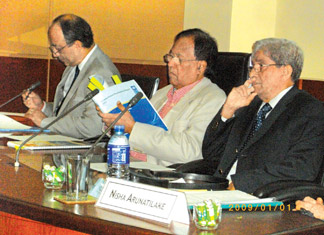Declining poverty may lead to increased inequality - Dr. Sarath
Amunugama
By Manjula Fernando
Sri Lanka backed by a higher GDP growth rate is creating an
environment for people to climb out of poverty into a vibrant middle
class, Senior Minister for International Monetary cooperation said at an
event organised to mark the launch of UNDP's second Sri Lanka Human
Development Report 2012 on Friday.
|

Dr Amunugama reads the Sri Lanka Report |
Speaking as the chief guest at the event held at the IPS auditorium,
the Minister said, "while it is important to talk about poverty,
malnutrition and deprivation, 'we should concentrate on the
characteristics of the middle class, their skills development and focus
our research and policy intentions on this vibrant group."
He said, "in India and China a new growth model is taking place. We
have to develop this country by the most expeditious and most feasible
economic strategy."
"We have to work on strategies to encourage this middle class, who
have made use of the State's expanded education and health facilities in
which successive governments have invested in, and try to create
opportunity so that this new class of people will emerge and give a big
thrust, like in China, India and Vietnam to transform the Sri Lankan
economy."
Allocation of resources by the government depends on the wealth the
government creates. That is why a very favourable GDP growth, an average
of 6 percent is seen today. Last year, it was 8-8.5 percent. This is a
very dramatic growth rate when you look at the region.
Quoting the report Minister Amunugama said, "For example if you look
at the macro economic estimates for Asian economies on real GDP growth,
in 2010 the Asian average was 7.7 percent, Sri Lanka was 8 percent,
China 10.4 percent, Hong Kong 7.1 percent, India 8.4 percent, Indonesia
6.2 percent, Japan 4.4 percent and Malaysia 7.2 percent.'
The environment here is conducive for the people to climb out of
poverty into the middle class. In Sri Lanka it is done in a big way. "We
have 1.5 million Sri Lankans working abroad remitting US $ 6 billion a
year. Almost every dollar of that goes to rural areas."
There are 22 million cellphones in the country, which is higher than
its population and there is a great demand for three-wheelers and small
cars. He attributed this to proof of an emergence of a dynamic middle
class.
He said, "If you look at the investment in the infrastructure in the
North and the East, it is way ahead of what has been committed in other
parts of the country.
"In the coming years there will be a change in the patterns of
regional growth," and added the next Human Development report will give
starkly different data. UN Assistant Secretary General and UNDP Director
of Regional Bureau for Asia and the Pacific Dr. Ajay Chibber delivering
the keynote address said in the previous decades Sri Lanka has always
led the way, in showing how to recreate South Asia with impressive
maternal mortality, education and other indicators. "There are so many
things the rest of the world has learned from Sri Lanka."
There was a period where Sri Lanka got distracted by both natural
disasters and man made disasters. But the time has come where Sri Lanka
will once again, show the region and others the way forward, certainly
on this issue of how to address growth and inequality.
In the whole area of climate change and development, he said he hoped
Sri Lanka again will be a path breaker and that the lessons learnt from
Sri Lanka will be applicable across the region.
He cautioned, in most cases of rapidly growing economies across Asia
and the Pacific with declining poverty there is a substantial rise in
inequality.
It's not that the poor and are getting poorer but it's that the rich
are getting richer very fast.
As Sri Lanka goes from lower income to upper income, there would be a
rise in inequality. Some people will get rich fast and while the others
try to catch up there will be a rise in inequality.
But, he warned that if inequality gets too high, there can be social
tension, a feeling of people being left behind and a feeling of being
disconnected from society, there could be serious political upheaval as
well.
There are some regions that are not doing well.
These must be addressed as the country aspires towards the upper
middle income status and continues in this path of very rapid growth to
achieve upper middle income status by 2016.
The second Sri Lanka Human Development Report 2012, prepared by UNDP
in partnership with Institute of Policy Studies has involved research
and study from 2010 through 2011 to 2012 before it was finalised with
inputs from expert economists based at UNDP headquarters.
The Chairman of IPS, Prof. Lakshman said, the report will be a
comprehensive database, to bridge the regional development disparities
for Budget and program interventions and it will be useful in the
government's on-going regional development planning.
Introducing the report, Lead Author, Dr. Nisha Arunathilaka of IPS
said, Sri Lanka has the highest level of human development among the
eight SAARC countries and except for India and the Maldives, others are
yet to reach Sri Lanka's HDI for 1980 which was 0.539.
At sub national level, out of 20 districts, Gampaha ranked first with
an HDI value of 0.752, followed by Kalutara - 0.733 and Colombo - 0.710.
The Colombo district does well in education and income but ranks second
lowest in the health index.
The report says the reason could be that many critically ill persons
from other districts are brought here for treatment and finally die
here.
The report classifies the reasons for revisiting regional dimensions
of human development, patterns of human development, bridging gaps in
the area of health, education and livelihoods.
|


